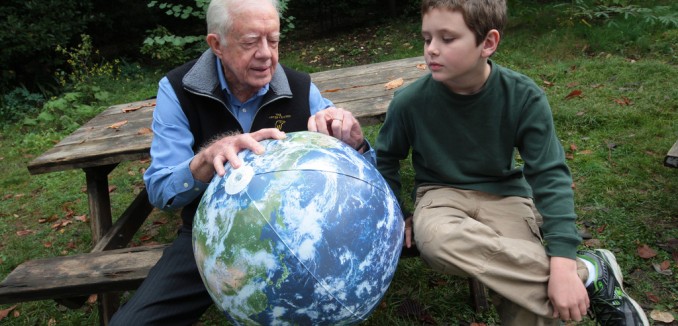Former President Jimmy Carter raised eyebrows and questions this week when he distanced himself — but using a suspiciously bizarre choice of words — from efforts to mount a boycott against the Jewish state. In an interview with the AP reprinted at the Ynet news site, Carter promoted a meeting of his group of famously anti-Israel diplomatic seniors known as “The Elders.”
According to the AP, the group “includes senior and retired leaders who work together on peace-building and humanitarian initiatives,” and who frequently and falsely accuse the Jewish State of committing war crimes. Among the participants are renowned critics of Israel including Desmond Tutu of South Africa, who has said the Palestinians are paying the price for the Holocaust, and Mary Robinson, the former Irish politician who famously presided over the anti-Israel orgy known as the U.N. World Conference on Racism in Durban, South Africa.
When asked about whether the group would endorse a boycott of Israel, Carter said that such a move would be “too much,” adding that
We decided not to publicly endorse any kind of embargo, or so forth, against Israeli invasion, or occupying troops in Palestine.
Although he did not spell out whether the “Israeli invasion” or “occupying troops” that would not be boycotted were identical with the State of Israel as a whole or just with the over 300,000 Jewish civilians living in post-1967 communities or settlements, he did raise the issue of product labels for goods produced in Israeli settlements — though again, his wording seemed deliberately chosen to make it unclear who the subjects of the labeling would actually be:
We have also encouraged Europeans for instance, at least to label products that are made by Israeli people who occupy Palestine and ship their products out of Palestine to be sold in Europe. … so that the buyers can decide whether they want to buy them or not…
On the question of the Israeli demand that Palestinians recognize the Jewish state as part of a peace deal, Carter seemed determined to warp Israel’s position far beyond recognition. After asserting (falsely, according to a former U.S. chief negotiator) that the demand had never been raised prior to its insistence by Prime Minister Netanyahu, he then unfurled what can only be described as a mind-bending strawman:
I don’t see how the Palestinians or the Arab world can accept that premise, that Israel is an exclusively Jewish state… Israel can claim ‘We are a Jewish state.’ I don’t think the Arab countries will contradict that Jewish statement. But to force the Arab people to say that all the Arab people that they have in Israel have to be Jews, I think that’s going too far.
Needless to say, the demand that Israel be recognized as a Jewish state, in accordance with UN General Assembly resolution 181, never has included the forcible conversion of Israeli Arabs to Judaism.
Carter has a history of creative circumlocutions that simultaneously distort and amplify his criticisms of Israel. In 2006, in response to criticism from Alan Dershowitz about what he called the “outrageous” invocation of Apartheid South Africa in the title of his book “Palestine: Peace Not Aprtheid,” Carter denied the claim that he had made any reference to Israel as an Apartheid state, adding that Dershowitz
has to go to the first word in the title, which is “Palestine,” not “Israel.” He should go to the second word in the title, which is “Peace.” And then the last two words [are] “Not Apartheid.” I never have alleged in the book or otherwise that Israel, as a nation, was guilty of apartheid. But there is a clear distinction between the policies within the nation of Israel and within the occupied territories that Israel controls[,] and the oppression of the Palestinians by Israeli forces in the occupied territories is horrendous. And it’s not something that has been acknowledged or even discussed in this country. . . . (Italics added.)
The sound of a generation of analysts and commentators blinking in unison can still be heard.
Jimmy Carter was President of the United States from 1977 to 1981.




